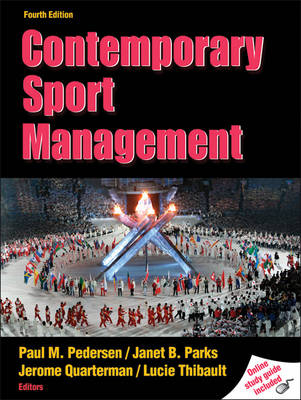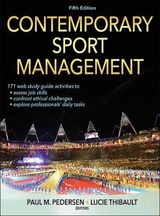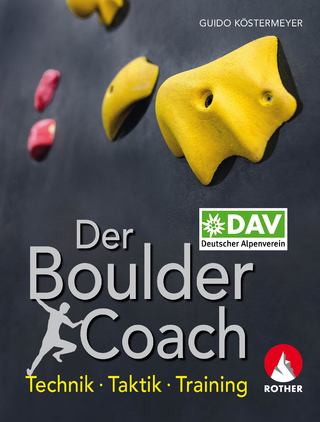
Contemporary Sport Management
Human Kinetics (Verlag)
978-0-7360-8167-2 (ISBN)
- Titel erscheint in neuer Auflage
- Artikel merken
Contemporary Sport Management, Fourth Edition, provides students with an overview of the sport management by presenting extensive discussions of the foundational aspects of the profession and current topics from the field. This thoroughly revised edition brings enhanced content to students with a full-color format and an integrated online study guide. The text also discusses the significance of sport as an international social institution. Students will learn the relevance of sociological, cultural, historical, political, psychological, and legal concepts to the management of sport; the necessary professional skills and attitudes of sport managers; and ways in which the globalization of sport continues to affect sport management professions.
One of the top-selling textbooks in the field, the fourth edition retains many of its popular learning tools for students and also offers several key enhancements:
- Three new chapters covering sport management issues in youth and community sport, interscholastic sport, and the history of the sport business industry address the growing needs in the field.
- International sidebars and associated activities within each chapter have been updated, providing readers with fresh ideas regarding cultural differences in sport as well as the effects of the globalization of sport on the sport management profession.
- A historical timeline, now in every chapter, puts major events into context.
- New ethics and critical thinking sections expand on the chapter topics to help students develop the competencies to make sound decisions and become ethical and principled sport managers.
- A running glossary, chapter objectives, and end-of-chapter reviews help students understand key concepts and terms.
In addition, a new online study guide (OSG) provides multiple interactive learning experiences that assist students in retaining the information. Each chapter of the text includes several cross-references to the OSG, allowing students to take advantage of the following features:
- Job opportunity activities demonstrate the skills that prospective employers are seeking within particular sport settings.
- Web searches point students to the vast amount of information available online.
- Portfolio activities help students reflect on specific questions related to the critical thinking and ethics sections of each chapter. Upon completion, students will have constructed a portfolio of their reflections on issues they may face as future sport management professionals.
- Comprehension checks with interactive activities help students more fully understand and apply the concepts covered in each chapter.
- Quizzes help students ensure they have mastered the major concepts of each chapter.
Reorganized in a four-part format, Contemporary Sport Management, Fourth Edition, begins with an overview of the field and important historical aspects of the industry. Next, the attributes of an effective and professional sport manager and the relevance of managerial and leadership concepts applied to sport management are discussed. In the second part, readers learn about the major settings in which sport management professionals work today, including professional and amateur sport management sites, sport management agencies, and sport tourism venues. The third part offers information on key functional areas of sport management, such as sport marketing, sport communication, finance and economics in sport, and sport facility and event management. In the final part, readers examine current challenges in the profession, such as issues related to consumer behavior, law, sociology, globalization, and the importance of continuing sport management research.
The updated and enhanced fourth edition of Contemporary Sport Management offers a varied and dynamic learning package to assist readers in understanding the many opportunities and challenges in the sport management field. From historical foundations and future directions to current issues and professional skill sets, this popular textbook continues to inform and inspire up-and-coming professionals to have a positive influence on the management of sport.
Paul M. Pedersen, PhD, the newest member of the editorial team, is an associate professor of sport management and the director of the sport management doctoral program at Indiana University at Bloomington. Previously, Pedersen taught sport communication and management courses at several colleges and universities, including Bowling Green State University and Palm Beach Atlantic University. A former sportswriter and sports business columnist, Pedersen has researched, published, and presented on the activities and practices of many sport organization personnel, specifically those associated with the print media (i.e., newspaper editors and reporters) and affiliated with intercollegiate and interscholastic sports (i.e., athletic directors and student-athletes). He has lectured and presented on sport communication and management topics around the world, including China and Korea. His primary area of scholarly interest is the symbiotic relationship between sport and communication. Pedersen has published over 55 peer-reviewed articles in journals such as the Journal of Sport Management, Sociology of Sport Journal, International Journal of Sports Marketing and Sponsorship, and Journal of Sports Economics. Pedersen has authored or coauthored Strategic Sport Communication (2007) and two sport history texts. Founder and editor in chief of the International Journal of Sport Communication, Pedersen also serves as an editorial review board member of five national and international sport journals. He is a research fellow for the North American Society for Sport Management (NASSM), a member of the North American Society for Sport History (NASSH) and the European Association for Sport Management (EASM), and a charter member of Sport Marketing Association (SMA). Pedersen lives in Bloomington, Indiana, with his wife, Jennifer, and their four children. He enjoys spending time with his family as well as traveling, photography, cycling, and watching sporting events. Janet B. Parks, DA, is distinguished teaching professor emerita, former graduate studies coordinator, and former sport management division chair at Bowling Green State University in Ohio. She was a founding member of the North American Society for Sport Management (NASSM), which has honored her with the Earle F. Zeigler Award for Professional Achievement (1992) and the NASSM Distinguished Service Award (2001). She is a NASSM research fellow; a fellow in the Research Consortium of the American Alliance for Health, Physical Education, Recreation and Dance (AAHPERD); and the recipient of the Outstanding Achievement Award from the Sport Management Council (SMC) of the National Association for Sport and Physical Education (NASPE) and the President's Award from the National Association for Girls and Women in Sport (NAGWS). She was twice selected as an honorary fellow in the Women's Studies Research Center at the University of Wisconsin at Madison. Parks is a founding coeditor of the Journal of Sport Management and has served on NASPE's Task Force on Sport Management Curriculum Accreditation (1986-93) and Sport Management Program Review Council (1993-94). In 2005 to 2006, she was an SMC/NASPE representative on the Task Force on Sport Management Curriculum Standards. During her 39 years on faculty at BGSU, Parks taught physical education and sport management and coached tennis and golf. Her published works include textbooks, book chapters, journal articles, and a computer program on sport management career guidance. Since retiring from teaching in 2004, Parks has written and produced Title IX: Implications for Women in Sport and Education, a three-disc DVD set designed for classroom use. Her most recent book, written in collaboration with Addi Muti and Ann Bowers, chronicles the history of women's sports at BGSU. An avid traveler, she makes her home in Bowling Green, Ohio, where she enjoys working on projects that preserve the history of women in physical education and sport. She also volunteers for several social service agencies in her community. Jerome Quarterman, PhD, is an associate professor in the department of health, human performance, and leisure studies at Howard University in Washington, DC. Prior to that, he was on the faculty at Florida State University and taught graduate students in research methods, organizational theory, and diversity in organizations of the sport industry. He was a tenured faculty member at Bowling Green State University of Ohio for 11 years. Prior to his position at Bowling Green, his teaching and administrative experiences were at historically black colleges and universities, including Southern, Alabama State, Kentucky State, Central State, Hampton, Florida A&M, and Lincoln universities. He is a member of the North American Society for Sport Management (NASSM) and the American Alliance for Health, Physical Education, Recreation and Dance (AAHPERD). Quarterman is an active researcher who has authored or coauthored 45 scholarly publications, including peer-reviewed journal articles, book chapters, and edited books. His research has appeared in the International Journal of Sport Management, Sport Marketing Quarterly, Journal of Sport Management, Academic Athletic Journal, Journal of Teaching Physical Education, Applied Research in Coaching and Athletics Annual, The Physical Educator, International Journal of Sport Marketing and Sponsorship, Journal of Physical Education, Recreation and Dance, and College Student Journal. He has also served on the editorial boards for International Journal of Sport Management, Athletic Academic Journal, and ICHPERSD Journal of Research. He has served on and chaired numerous master and doctoral committees at Bowling Green, Florida State, and Howard universities. He teaches students in a variety of courses at the undergraduate, master's, and doctoral levels, including organizational theory, intercollegiate athletic administration, research methods in sport management, ethics and social issues in sport, human resources management, sport marketing, and diversity in sport organizations. Quarterman holds a doctoral degree from Ohio State University, a master's degree from Kent State University, and a bachelor's degree from Savannah State University. He is the proud parent of Terrance and Michele. Lucie Thibault, PhD, is an associate professor at Brock University in Ontario, Canada. Before working at Brock University, Thibault taught at the University of British Columbia for 8 years and the University of Ottawa for 5 years. In more than 20 years of teaching, Thibault has instructed courses in organizational theory, organizational behavior, ethics in sport, globalization of sport, and policy and social issues in sport. Thibault serves on the editorial board of the International Journal of Sport Policy as well as the Journal of Sport Management where she previously held the posts of associate editor and editor. She is a member of the North American Society for Sport Management (NASSM) and was named a NASSM research fellow in 2001. In 2008, Thibault was awarded the Earle F. Zeigler Award from NASSM for her scholarly and leadership contributions to the field. Her research interests lie in the formation, management, and evaluation of cross-sectoral partnerships in sport organizations. She also investigates the role of the Canadian government in sport excellence and sport participation and government involvement in developing sport policy. Her research has appeared in the Journal of Sport Management, International Review for the Sociology of Sport, Journal of Sport and Social Issues, Human Relations, Leisure Studies, European Sport Management Quarterly, and International Journal for Sport Management and Marketing. Thibault resides in St. Catharines, Ontario.
A Letter to Students and Instructors Acknowledgments Part I. Introduction to Sport Management Chapter 1.Managing Sport in the 21st Century Janet B. Parks, DA; Jerome Quarterman, PhD; and Lucie Thibault, PhD Defining Sport and Sport Management Nature and Scope of the Sport Industry Unique Aspects of Sport Management Sport Management Competencies Future Challenges and Opportunities Learning Aids Chapter 2.Developing a Professional Perspective Sally R. Ross, PhD; Kathryn S. Hoff, PhD; and JoAnn Kroll, MEd Professional Preparation Professional Attitude Career Planning and Management Occupational Information Learning Aids Chapter 3.Historical Aspects of the Sport Business Industry Lawrence W. Fielding, PhD; Paul M. Pedersen, PhD; and Brenda G. Pitts, EdD Historical Aspects of Commercialization in Sport Historical Aspects of the Sport Market Critical Thinking in the History of the Sport Business Industry Ethics in the History of the Sport Business Industry Learning Aids Chapter 4.Management Concepts and Practice in Sport Organizations Lucie Thibault, PhD; and Jerome Quarterman, PhD Organization Defined Organizational Environment Organizational Effectiveness Organizational Structure Organizational Design Structure and Design of Sport Organizations Strategy Organizational Culture Organizational Change Critical Thinking in Sport Organizations Ethics in Sport Organizations Learning Aids Chapter 5.Managerial Leadership in Sport Organizations Jerome Quarterman, PhD; Ming Li, EdD; and Lucie Thibault, PhD Theoretical Approaches to Management Management Functions Managerial Roles Leadership Decision Making, Authority, and Power Human Resource Management Organizational Diversity Critical Thinking in Organizational Behavior and Human Resource Management Ethics in the Leadership of Sport Organizations Learning Aids Part II. Selected Sport Management Sites Chapter 6.Professional Sport James M. Gladden, PhD; and William A. Sutton, EdD Nature of Professional Sport History of Major American Professional Sport Unique Aspects of Professional Sport Revenue Sources for Professional Sport Teams Future Challenges Facing Professional Sport Career Opportunities in Professional Sport Critical Thinking in Professional Sport Ethics in Professional Sport Learning Aids Chapter 7.Intercollegiate Athletics Ellen J. Staurowsky, EdD; and Robertha Abney, PhD Origins of Intercollegiate Athletics Governance Basics of College Sport Finance Intercollegiate Athletics Administrators Critical Thinking in Intercollegiate Athletics Ethics in Intercollegiate Athletics Learning Aids Chapter 8.Interscholastic Athletics Warren A. Whisenant, PhD; and Eric W. Forsyth, PhD Arrival of Interscholastic Athletics Governance of Interscholastic Athletics Value of Interscholastic Athletics Programs Participation Numbers Operating Models Careers in Interscholastic Athletics Issues Facing Interscholastic Athletics Critical Thinking in Interscholastic Athletics Ethics in Interscholastic Athletics Learning Aids Chapter 9. Youth and Community Sport Marlene A. Dixon, PhD; and Jennifer E. Bruening, PhD Origins and History of Community Sport in North America Youth Sport History Definition of Community Sport Size and Scope of Community Sport Types of Community Sport Organizations Management Challenges Adult Community Sport Offerings Youth Sport Offerings Critical Thinking in Community Sport Ethics in Community Sport Learning Aids Chapter 10.Sport Management and Marketing Agencies William A. Sutton, EdD; Nicole Fowler, MBA; and Mark A. McDonald, PhD Functions of Sport Management and Marketing Agencies Types of Sport Management and Marketing Agencies Careers and Challenges Critical Thinking in Agency Activities Ethics in Agencies and Revenue Sources Learning Aids Chapter 11. Sport Tourism Heather Gibson, PhD; and Sheranne Fairley, PhD Tourism and the Tourism Industry Defining Sport Tourism Sustainability and Sport Tourism Critical Thinking in Sport Tourism Ethics in Sport Tourism Learning Aids Part III. Selected Sport Management Functions Chapter 12.Sport Marketing F. Wayne Blann, EdD; and Ketra L. Armstrong, PhD Developing a Sport Marketing Plan Critical Thinking in Sport Marketing Ethics in Sport Marketing Learning Aids Chapter 13.Communication in the Sport Industry G. Clayton Stoldt, EdD; Stephen W. Dittmore, PhD; and Paul M. Pedersen, PhD Theoretical Framework of Sport Communication Strategic Sport Communication Model Media Relations in Sport Community Relations in Sport Critical Thinking in Sport Communication Ethics in Sport Communication Learning Aids Chapter 14.Finance and Economics in the Sport Industry Timothy D. DeSchriver, EdD; and Daniel F. Mahony, PhD Current Financial Situation of US Professional Sport Current Financial Situation in US College Athletics Economics of Sport Overview of Financial Management Sources of Revenues and Expenses for Sport Organizations Careers in Financial Management for Sport Organizations Critical Thinking in Sport Finance and Economics Ethics in Sport Finance and Economics Learning Aids Chapter 15.Sport Facility and Event Management Robin Ammon, Jr., EdD; and David K. Stotlar, EdD Types of Facilities Facility Management Event Management Critical Thinking in Sport Facility and Event Management Ethics in Sport Facility and Event Management Learning Aids Part IV. Current Challenges in Sport Management Chapter 16.Sport Consumer Behavior B. Christine Green, PhD; and Carla A. Costa, PhD Understanding the Individual as a Sport Consumer Group Influences on the Sport Consumer Situational Influences on the Sport Consumer Consumer Decision Making in Sport Challenges Critical Thinking in Sport Consumer Behavior Ethics in Sport Consumer Behavior Learning Aids Chapter 17.Legal Considerations in Sport Management Anita M. Moorman, JD; and R. Christopher Reynolds, JD Basics of Law Federal Constitution Federal Legislation State Legal Systems Summary of Fundamental Sport Law Components Future Challenges Critical Thinking in Sport Law Ethics in Sport Law Learning Aids Chapter 18. Sociological Aspects of Sport Nicole M. LaVoi, PhD; and Mary Jo Kane, PhD Defining Sport Sociology Social Significance of Sport Benefits of Sport Dark Side of Sport Sport as a Vehicle for Social Transformation Implications for Sport Managers Critical Thinking in Sport Sociology Ethics in Sport Sociology Learning Aids Chapter 19.A North American Perspective on International Sport Ted Fay, PhD; Luisa Velez, PhD; and Janet B. Parks, DA What is International Sport? Expansion of International Sport Current Issues in International Sport Essentials for Aspiring International Sport Managers Forecasting the Future: International Sport 2010-2020 Critical Thinking in International Sport Ethics in International Sport Learning Aids Chapter 20.Sport Management Questions and Research Jess C. Dixon, PhD; Wendy Frisby, PhD; and Robert Boucher, PhD Research Questions and Their Origins Why Sport Managers Need to Understand Research What is Sport Management Research? Key Concepts Current Challenges in Sport Management Research The Future of Sport Management Research Critical Thinking in Sport Management Research Ethics in Sport Management Research Learning Aids Index About the Editors About the Contributors
| Erscheint lt. Verlag | 21.10.2010 |
|---|---|
| Zusatzinfo | 131 colour illustrations, 25 colour illustrations |
| Verlagsort | Champaign, IL |
| Sprache | englisch |
| Themenwelt | Sachbuch/Ratgeber ► Sport |
| Wirtschaft | |
| ISBN-10 | 0-7360-8167-4 / 0736081674 |
| ISBN-13 | 978-0-7360-8167-2 / 9780736081672 |
| Zustand | Neuware |
| Haben Sie eine Frage zum Produkt? |
aus dem Bereich



